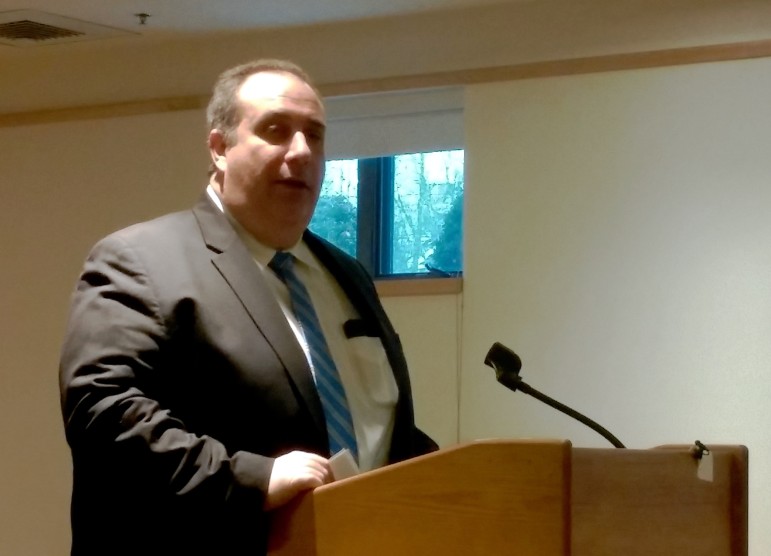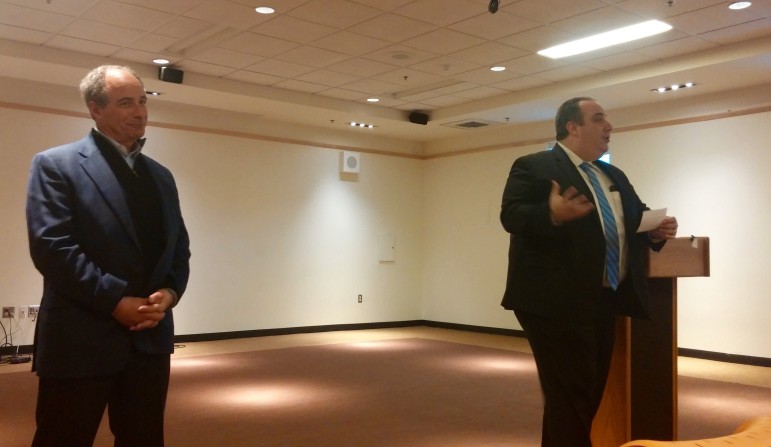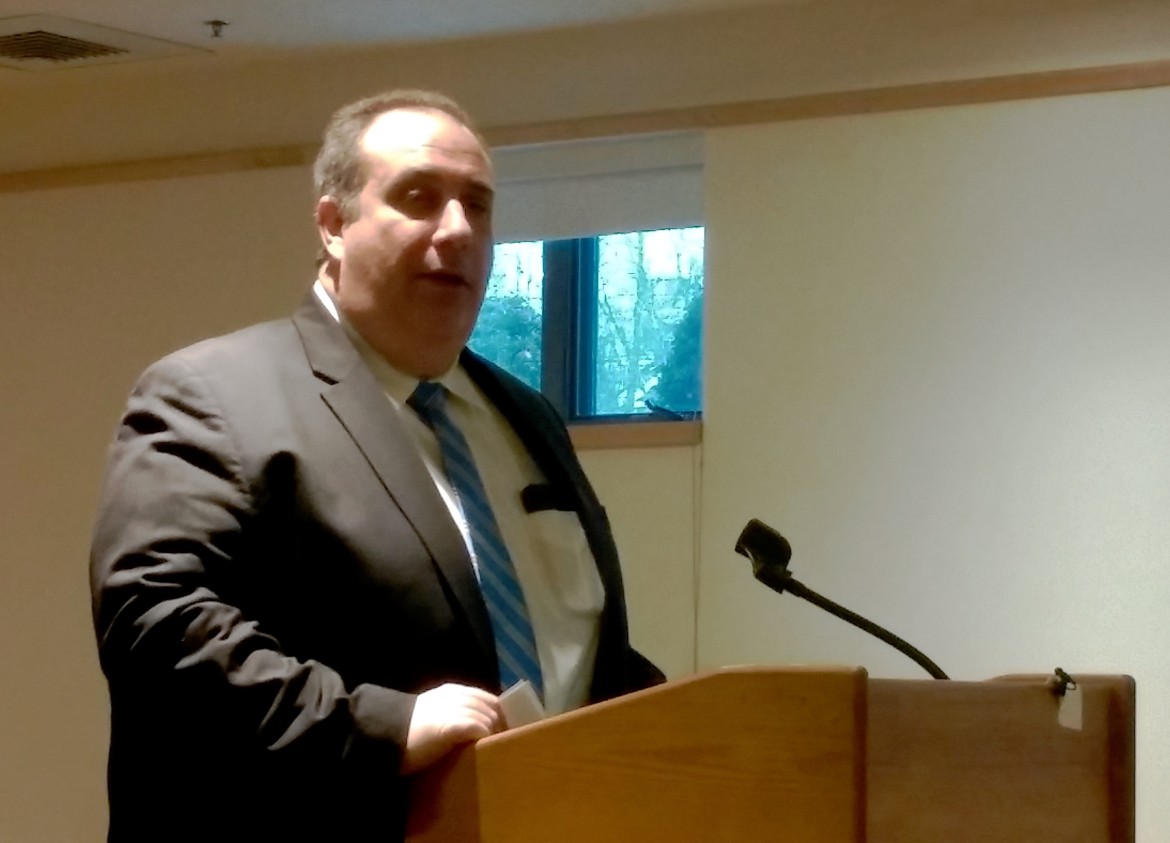
Charlie Breitrose
Gloucester Police Chief Leonard Campanello talked about his town’s groundbreaking approach to fighting heroin and opiate addiction at the Watertown Library.
A room filled with people searching for ways to end the epidemic of heroin and opioid addiction listened with rapt attention Tuesday afternoon to the Massachusetts police chief credited with finding a new and effective way of tackling the problem.
After four people in his community died from heroin overdoses last spring, Gloucester Police Chief Leonard Campanello decided to move away from the traditional model of arresting drug user. His department announced on Facebook that any addict who walks into the police station with all of their drug equipment and drugs and asks for help will not be charged. Instead they would be helped to get treatment.
The message resonated far beyond Gloucester.
“We had 2.4 million people view the post, from all 50 states and other countries,” Campanello said during his presentation to the Watertown Access to Treatment, Education and Resources for Substance Use Disorder Task Force. The packed room at the Watertown Free Public Library gasped when he shared that number.
Campanello has become nationally known for his program, and was featured recently in a front-page story in the New York Times.
The new program, which is known as the Police Assisted Addiction and Recovery Initiative, started June 1, 2015, and Campanello said he was not sure whether no one would show up, fearing it was a sting, or whether they would be overwhelmed. It took a few days and then they had their first person come seeking help.
“It was a guy from California who heard about it on Facebook. He contacted a woman in Danvers who bought him a plane ticket, picked him up at the airport and drove him to the Gloucester Police Department at 3 a.m.,” Campanello said.
Even though the man was not from town, they helped him out. They have done so with all 391 people who have come to Gloucester seeking help. About 40 percent are from Gloucester and 60 percent from outside.
Campanello acknowledges that his program goes against what has been the long practice of police to arrest everyone involved with drugs. He himself was part of the Essex County Drug Task Force.
However, along with helping people get treatment, Campanello said he has also seen a 31 percent drop in drug addiction-related crimes –” smash and grabs,” shoplifting, and burglary.
“There is no way, even on my best day, I could come up with a program that reduce crime by 31 percent,” Campanello said.
The program also has been cost effective compared to arresting a drug addict and prosecuting him or her. The Gloucester Police spend $220 of taxpayer money to arrest, book, and lock up the suspect so they can be put in front of a judge. Campanello said he spends $55 to get someone into treatment, and he does not spend taxpayer dollars but rather uses funds his department receives from drug seizures.
The Partnership
The Gloucester Police have not done it all alone. It receives a helping hand from local volunteers, treatment centers, local pharmacies and ambulances and even national companies.
A key partner in establishing PAARI was John Rosehnthal. Campanello approached him because he knew Rosenthal’s history of success taking on tough issues. The Newton man is behind the Stop Handgun Violence campaign and the famous billboard overlooking the Mass Pike next to Fenway Park. He also started the Friends of Boston Homeless when he found many homeless were working but could not afford the rents in the Hub.
Rosenthal said the new rash of opioid addictions is different from the past, and has gotten more attention – for better or worse – because it is touching affluent communities and poor ones alike. The addiction often starts in an unexpected way.
“Eighty percent of people presenting (as addicted) to heroin begin with legal pain killers,” Rosenthal said.

Charlie Breitrose
Gloucester Police Chief Leonard Campanello, right, and John Rosenthal of Newton, have teamed up to create Police Assisted Addiction and Recovery Initiative.
Rosenthal is now taking on the over-prescribing of opiate-based pain killers such as Oxycontin, naloxone and Demerol.
“We need to hold accountable the (pharmaceutical) manufacturers, medical professionals and treatment centers,” Rosenthal said. “Treatment is not one-size fits all.”
PAARI has already exposed some practices of the treatment centers that have not been helpful for addicts seeking treatment. One example is a rule that if anyone in treatment relapses, they cannot comeback for 14 days.
“There is nothing in the (state Department of Public Health) regulations that says that,” Rosenthal said, adding that it has become a practice of the centers.
Rosenthal encouraged those in the room to ask their state senators and state representatives to pass legislation to improve treatment for addiction.
Helping Hands
Gloucester’s effort is also known as the Angel Program, because the police have found volunteers to “figuratively or literally hold their hands” as they wait to get into a treatment program.
Rather than have a worker at the treatment center do the intake, the police officers now do it, Campanello said. Finding a spot can be tough, but the Gloucester Police have developed a network of about 200 treatment centers in 27 states.
One of the keys to the PAARI’s success, Campanello said, was making sure that those looking to get clean have a bed to go to in a treatment center. This was another challenge. Campanello said that the fact that they were coming at the problem with little background helped the police.
The police were confronted with situations such as the treatment center has a bed, but it is for a female and the police were looking to place a male. Therefore, the center said it could not give the bed to the man.
“We asked what every 3 year old asks – why?” Campanello said, adding that they were able to place the man, and all of the 391 people who have come to the Gloucester PD.
Rosenthal said it also helps that people are not used to saying “no” to police, and police officers are not used to taking “no” for an answer.
Once the program got rolling, Campanello said others provided help. Treatment centers have offered scholarships to those who do not have insurance, his local ambulance companies have offered to drive people to any treatment center in Massachusetts for $75, and local pharmacies have cut the price of Narcan – the anti-opiate-overdose drug – from $140 without insurance to $20.
Taxi companies in Gloucester have also stepped up, saying if police cannot find an ambulance to take someone to a treatment center, they will drive them for free. Uber too, has gotten involved, Campanello said. While they are working things out in Massachusetts they have offered to help anyone going to a treatment facility out of state by picking them up at the airport and driving them to the facility free of charge. Uber plans to help out in other ways, including having a button on their cellphone app which can be pressed if someone is having an overdose and an Uber driver trained to use Narcan will come and administer the drug, Campanello said.
Once he started going down the road toward getting people into treatment, Campanello found people want to help.
“It’s amazing. All these people came forward,” Campanello said. “They say, I had a brother, a cousin, a mother …”
Gloucester keeps track of the people it has helped. It is not a 100 percent success rate, but Rosenthal said that it is a disease, and just like people with cancer have a relapse people with addictions sometimes need multiple treatments.
The first man to come to Gloucester was sent back to California to a center there for treatment, and Campanello said he keeps in touch.
“The kid from California is 241 days clean,” Campanello said.
While he remembers the successes, one case haunts him. A woman named Stephanie Jesi came forward and went through multiple treatments but in December she overdosed and died in a hotel room.
Watertown’s Efforts
Watertown has faced its own epidemic of heroin and opiate addiction. In 2015, 10 people died from overdoses and many more suffered overdoses.
Gloucester has been joined by 56 police departments in 17 states, Campanello said, including Watertown. The town’s effort is not exactly the same as Gloucester’s, said Watertown Police Lt. Dan Unsworth.
“Our program looks more like Arlington’s,” Unsworth said. “We have a clinician who plays a key role. She reaches out to someone that has addiction issues. The focus is to encourage and try to coax people into treatment.”
Similar to Gloucester, Watertown is trying to build trust with the police.
“We want to build the idea of outreach and that it is OK to to call the cops,” Unsworth said.
In October, the Watertown Access to Treatment, Education and Resources for Substance Use Disorder Task Force held the Erase the Stigma Week to try to raise awareness of the problem and get people to seek treatment.
Deb Rosati, Watertown’s director Public Health, said Tuesday’s visit by Campanello and Rosenthal has created momentum behind Watertown’s effort.
“We found the presentation and the speakers energizing and offering great information that we will certainly integrate into our own Task Force action plan,” Rosati said. “The partnership between Gloucester, the PAARI initiative and Watertown is invaluable, and we hope to propel our Task Force activities forward to the next level of providing assistance to those in need and continuing to erase the stigma of addiction.”
